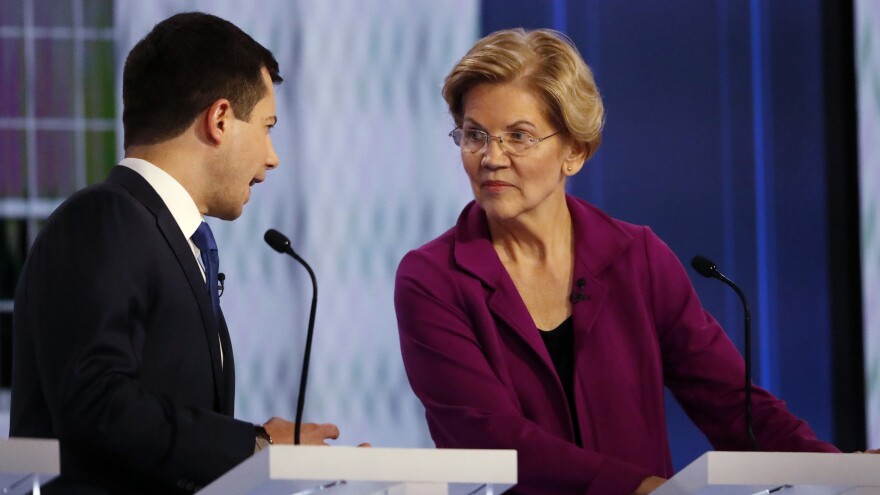The top seven Democratic presidential candidates will appear on stage in Los Angeles Thursday night in the sixth debate of the year.
The debate comes just one day after President Trump became the third president of the United States to be impeached by the House of Representatives.
Here's what you need to know:
Can't see the video? Click here.
How to watch a livestream of the debate
The debate is set to begin at 8 p.m. ET and last around three hours. It is co-hosted by PBS NewsHour and Politico and will take place at Loyola Marymount University in Los Angeles.
The debate will be televised on PBS and CNN, livestreamed online at , PBS NewsHour, , and , and available on many of the news organizations' social, mobile and live-TV streaming apps. You can also listen to the debate on SiriusXM channels 116, 454, and 795.
will also be streaming special coverage of the debate, and the politics team will provide live fact-checking and analysis throughout the evening. You can also subscribe to The NPR Politics Podcast for a debate recap and analysis afterward.
Which candidates will be there?
Thursday marks the smallest debate lineup yet for the 2020 Democratic presidential primary as the Democratic National Committee continues to raise the polling and fundraising thresholds to qualify.
Joe Biden, former vice president
Pete Buttigieg, mayor of South Bend, Ind.
Amy Klobuchar, senator from Minnesota
Bernie Sanders, senator from Vermont
Tom Steyer, business executive and activist
Elizabeth Warren, senator from Massachusetts
Andrew Yang, entrepreneur and philanthropist
Who is moderating and what is the format?
The debate will be moderated by Judy Woodruff, anchor of PBS NewsHour; Amna Nawaz, PBS senior national correspondent; and Yamiche Alcindor, PBS White House correspondent. They will also be joined by Politico's chief political correspondent, Tim Alberta.
According to Politico, the debate will not feature any candidate opening statements, and there will be three designated breaks throughout the event.
Get caught up: What's happened since the last round?
Former New York City Mayor and billionaire Michael Bloomberg entered the presidential race in late November. Just over a week later on Dec. 3, Sen. Kamala Harris of California ended her presidential bid, surprising many as one of the higher-profile candidates in the race.
Harris had qualified for Thursday's debate but ended her campaign because of inadequate fundraising.
Shortly after Harris' withdrawal, the hashtags # DemsSoWhite and #DebateSoWhite were used to criticize the anticipated debate for featuring almost exclusively white candidates. Andrew Yang, who is Asian American, qualified for the deba te on Dec. 10.
Several candidates who did not qualify for the debate — including New Jersey Sen. Cory Booker and former Housing and Urban Development Secretary Julián Castro — have spent the past few weeks publicly campaigning against the DNC's new requirements, arguing that the new rules are too restrictive and limit potential voices of color on the stage.

Meanwhile, Biden maintains a national lead at 24%, followed closely by Sanders at 22%, Warren at 17% and Buttigieg at 13%, according to the latest .
The same polling shows a continually growing gap between those candidates and the rest of the contenders — with Yang next at 5% and Klobuchar, Bloomberg and Booker at 4%.
For a time, it was unclear whether any of them would make it to the stage.
The debate comes on the heels of a newly settled labor dispute between the food-service workers at the school and their contracting company Sodexo, a fight that prompted all seven candidates to threaten to boycott the event in solidarity with the workers.
The workers and Sodexo reached an agreement Tuesday, and the debate will remain at Loyola Marymount University.
More NPR reporting you don't want to miss
Recent features:
Interviews with the candidates:
On Dec. 6, NPR's Rachel Martin sat down with Biden for an interview just days after he engaged in a tense exchange with an Iowa voter over his son's involvement on the board of Ukrainian energy company, Burisma.
Also, catch up on NPR's Off Script video series — where presidential candidates discuss various policies with affected voters — and listen to in-depth interviews with candidates from NPR's politics team in The NPR Politics Podcast's On The Trail series.
Copyright 2020 NPR. To see more, visit https://www.npr.org. 9(MDAyNDY5ODMwMDEyMjg3NjMzMTE1ZjE2MA001))





